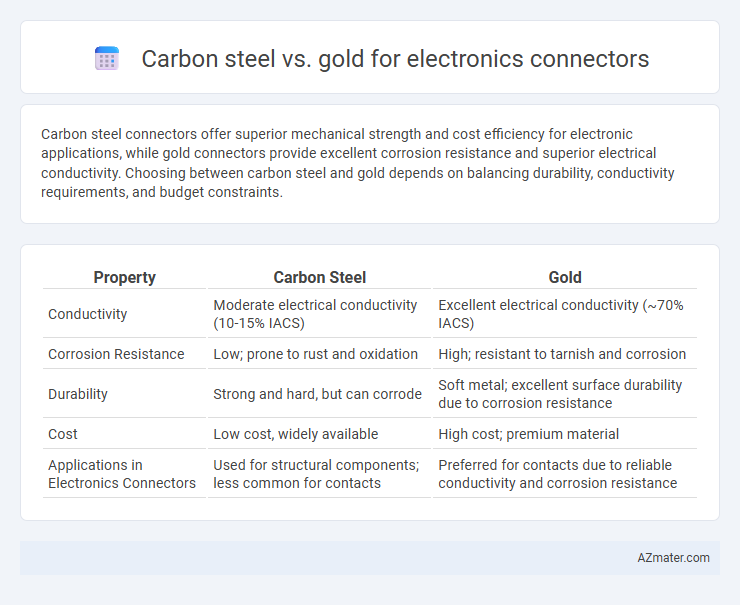Carbon steel connectors offer superior mechanical strength and cost efficiency for electronic applications, while gold connectors provide excellent corrosion resistance and superior electrical conductivity. Choosing between carbon steel and gold depends on balancing durability, conductivity requirements, and budget constraints.
Table of Comparison
| Property | Carbon Steel | Gold |
|---|---|---|
| Conductivity | Moderate electrical conductivity (10-15% IACS) | Excellent electrical conductivity (~70% IACS) |
| Corrosion Resistance | Low; prone to rust and oxidation | High; resistant to tarnish and corrosion |
| Durability | Strong and hard, but can corrode | Soft metal; excellent surface durability due to corrosion resistance |
| Cost | Low cost, widely available | High cost; premium material |
| Applications in Electronics Connectors | Used for structural components; less common for contacts | Preferred for contacts due to reliable conductivity and corrosion resistance |
Introduction: Carbon Steel vs Gold in Electronics Connectors
Carbon steel and gold serve distinct roles in electronics connectors, with carbon steel prized for its strength and cost-effectiveness, while gold offers superior corrosion resistance and conductivity. Gold-plated connectors are preferred in high-performance electronics where signal integrity and durability are critical, despite higher material costs. Carbon steel connectors, often coated to prevent oxidation, are commonly used in applications prioritizing mechanical robustness and budget constraints.
Material Properties and Conductivity
Carbon steel offers high mechanical strength and durability, making it suitable for connectors requiring robust physical integrity and wear resistance. Gold provides superior electrical conductivity and excellent corrosion resistance, ensuring minimal signal loss and long-term reliability in electronic connections. While carbon steel connectors may require plating for improved conductivity, gold connectors inherently maintain stable performance under varied environmental conditions.
Corrosion Resistance and Durability
Gold connectors offer superior corrosion resistance compared to carbon steel, as gold is inert and does not oxidize or tarnish over time, ensuring reliable conductivity in electronic applications. Carbon steel connectors, while durable and strong, are prone to rust and corrosion unless coated or plated, which can compromise long-term performance and signal integrity. In environments with high humidity or exposure to corrosive elements, gold connectors provide enhanced durability and sustained electrical performance, making them ideal for critical electronic connectors.
Electrical Performance Comparison
Carbon steel connectors offer high mechanical strength but exhibit higher electrical resistivity, around 10 uO*cm, resulting in increased signal loss and reduced conductivity compared to gold, which has a low resistivity of about 2.44 uO*cm. Gold connectors provide excellent corrosion resistance and stable conductivity, ensuring minimal signal degradation and reliable performance in high-frequency electronic applications. The superior electrical performance of gold makes it the preferred choice for sensitive connectors requiring low contact resistance and enhanced signal integrity.
Cost Analysis and Economic Considerations
Carbon steel offers a significantly lower cost compared to gold, making it an attractive option for budget-sensitive electronics connectors. While gold provides superior corrosion resistance and conductivity, its high price increases the overall manufacturing expenses. Economic considerations often favor carbon steel in applications where cost efficiency outweighs the premium benefits of gold connectors.
Application Suitability in Electronics
Carbon steel offers high strength and durability, making it suitable for structural components in electronic connectors but lacks corrosion resistance compared to gold. Gold provides excellent electrical conductivity and corrosion resistance, ensuring reliable signal transmission and long-term performance in sensitive electronic connections. Applications requiring low contact resistance and longevity typically favor gold, while carbon steel is more economical for mechanically robust but less critical conductive parts.
Manufacturing and Processing Differences
Carbon steel connectors offer high strength and durability, benefiting from cost-efficient manufacturing processes such as stamping, machining, and plating for corrosion resistance. Gold connectors provide superior electrical conductivity and corrosion resistance, requiring precise electroplating techniques to deposit thin, uniform gold layers over copper or other base metals. The choice between carbon steel and gold in electronics connectors hinges on balancing manufacturing complexity, material costs, and performance requirements like conductivity and longevity.
Environmental Impact and Sustainability
Carbon steel connectors exhibit a lower environmental impact than gold due to their abundant availability and recyclability, reducing resource depletion. Gold offers superior corrosion resistance and conductivity but mining operations contribute significantly to habitat destruction and toxic waste generation. Sustainable electronics design increasingly favors carbon steel as a cost-effective, eco-friendly alternative that minimizes ecological footprint while meeting performance needs.
Reliability and Lifespan in Real-World Scenarios
Carbon steel connectors offer high mechanical strength and cost-effectiveness but are prone to corrosion and oxidation, which can degrade reliability and reduce lifespan in humid or chemically aggressive environments. Gold-plated connectors provide superior corrosion resistance, excellent conductivity, and stable signal performance, enhancing long-term reliability and durability in diverse real-world conditions. For critical electronics requiring minimal maintenance and consistent connectivity, gold plating significantly extends connector lifespan compared to untreated carbon steel.
Future Trends in Connector Material Selection
Future trends in connector material selection emphasize enhanced conductivity, corrosion resistance, and cost-effectiveness, positioning gold as a superior choice due to its excellent electrical performance and inertness. Innovations in carbon steel alloys aim to improve durability and reduce costs, making it a competitive alternative for less critical applications. Emerging nanocoatings and hybrid materials seek to combine gold's conductivity with carbon steel's mechanical strength to optimize electronic connector efficiency and longevity.

Infographic: Carbon steel vs Gold for Electronics connector
 azmater.com
azmater.com